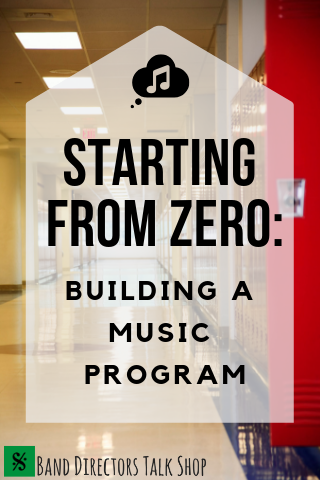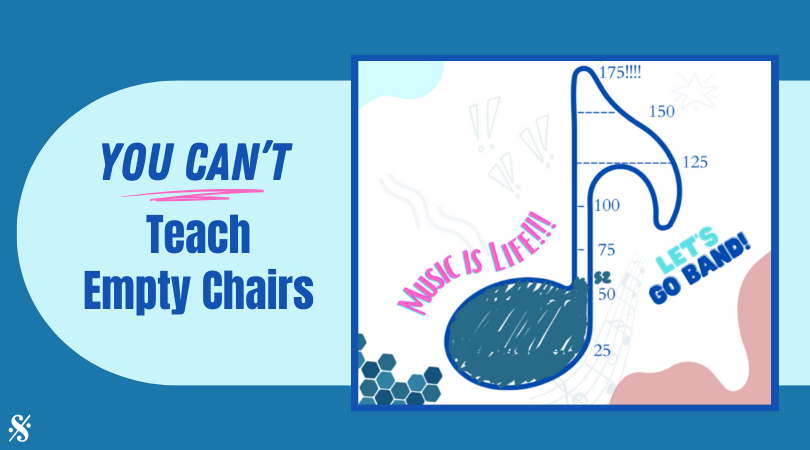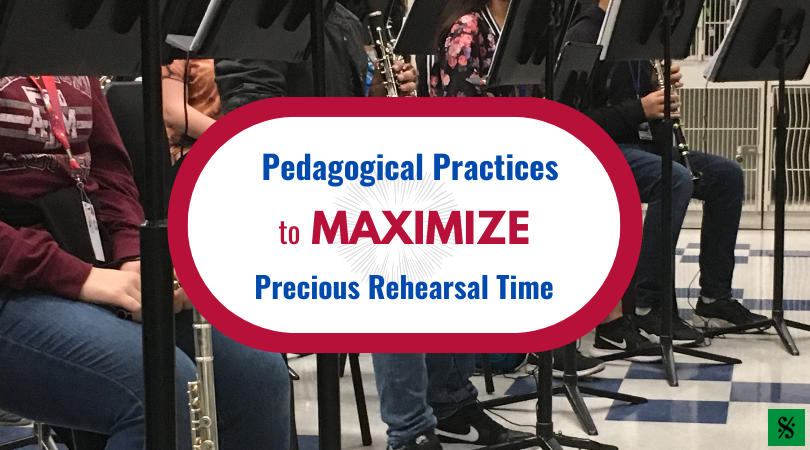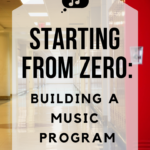Building a music program from scratch is a challenging task for any music teacher. With only a couple students, little to no music library, no instruments, and a budget that is small to non-existent, these components make building a program a complicated task. For many teachers building a music program is an ideal situation, especially if the teacher is a first-year teacher looking to get their foot in the door to teaching. Developing a music program is something that many music educators will encounter during their teaching career. I will present some creative ideas and ways on how to build a strong music program from scratch.

Some things for directors to consider doing when building a program are:
1. Developing a vision for the program
2. Doing prep work over the summer
3. Developing recruitment strategies
4. Developing a list of needed resources (instruments, music, funding, and admin support)
5. Developing ways to create visibility for your program
Have a Vision
Having a vision for your program is essential. When developing a vision, think about how you see the program. For band programs, consider: will you have a drum major, do you want a flag line, what would you like the band uniforms to look like, what type of music will your band play, what type of marching style will you use? Next, consider what you would like to accomplish. Is your goal to take a group to contest, would you like to have a group perform at a major event such as a parade, perform in New York, or perform in the community? How many students are in your program and how many students do you want to see in your program? These important questions will help any teacher as they begin the process of developing their band program.
Prepare over the summer
Using your time wisely over the summer is an important step in ensuring your music program has a successful year. Some things to do during the summer are: copy music, design your classroom, make connections with current and future students, and make relationships with those in the community. Copying all the music you will need is essential. It is also a great idea to make copies of music that you might not need. Having extra music ready can come in handy in the event of a last-minute performance opportunity. Designing your classroom is also important as it will show students that you are organized. With an organized classroom, more time can be spent on teaching and not trying to instruct students where to sit. Sending a friendly email to your current and future students can help everyone get prepared for the upcoming school year. Contacting students and their parents allows you time to introduce new things that you are planning for that upcoming year. Lastly, making connections with the community can open performance opportunities for your group. You can never have too big of a fan base.
Recruitment
Recruiting students to your program is essential if you want to see the program grow. If you are part of a school system that has other schools feed into your school, speak with your administration before starting the process. Some things to ask your administration: are there any funds to travel to other schools to speak to students about your program, are you granted release time to put on recruitment performances, and are you able to bring in guest performers to work with your students? These questions are essential as they will help you begin the process of recruiting students to your program. Remember to be enthusiastic and friendly when talking about your program as you want to include anyone who is interested. One of the most important things to remember about recruitment is that your students are a great tool to recruit others. Students are able to convince their friends to join them in something that they consider fun and exciting. Let your students help spread the word and help bring in new faces to grow your program. Lastly, remember that depending on the area where you are located, only certain recruitment ideas will work. Figure out what works best for your area. Recruiting can and will take a lot of commitment, time, and energy. Realize you will feel overwhelmed at times, but never give up.
Developing Resources
Having a music program means you will need resources in order to perform and also attract students. Some things to think about for band are: what instruments will you need, what music is lacking in your library, how much will those instruments cost, and what is your budget for your program. When researching instruments, it is a good idea to receive multiple quotes from companies. Finally, do what you can to get your administrators on board to support your program. When your administrators show support it shows others that the program is being set up for success.
Develop plan to publicize the program
Publicizing your program is important if you want others to know what your program does. Some ways to publicize your program include sending emails to the community, printing flyers, and social media posts. Things you want to publicize are student solo performances, guest artist appearances, concert dates, and more. You can never over-publicize your program; it is essential to keep everyone informed about every big or small thing. If your program is doing something, let others know. Not only will others see what you are doing, but it also lets the students who are participating in your program know that you believe in them.
Other Considerations:
- Be honest and be yourself
- Maintain a positive outlook
- Prepare, Prepare, Prepare, and Prepare
- Keep the music fun
- Don’t let the political side win
- Develop recruiting materials (flyers, business cards, brochures) – pass these materials out at local schools, churches, any and all school events.
Patrick Moore is an active percussion performer, educator, arranger, adjudicator, and clinician. Moore is a versatile percussionist with experience in many areas of percussion. Patrick is an education endorser of Vic Firth Sticks and Mallets, and Majestic percussion. Professor Moore is a published author having works published with Alfred Publishing Company and Kendor Music. Moore has presented clinics at numerous music education conferences in the United States as well in Guatemala. Currently, Patrick Moore is the Director of Bands at South Carolina State University in Orangeburg, South Carolina. Mr. Moore received his Bachelor of Music from the University of Arkansas, Masters from Texas Tech and is also pursuing his Ed.D from Abilene Christian University.
Related Reading:
Motivation, Innovation, and Differentiation in Your Beginning Band
How to Find Grants for Your Band
15 Music Education Resources to Follow
If you would like to receive our weekly newsletter, sign up here.
Don’t forget to like us on Facebook too!
Learn. Share. Inspire.
BandDirectorsTalkShop.com






Leave a Reply
You must be logged in to post a comment.